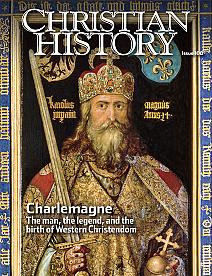CHARLEMAGNE DOMINATED MEDIEVAL EUROPE AND SUPPORTED THE CHURCH
CHARLES THE GREAT (Charlemagne) died on this day 28 January 814. He had contracted pleurisy a few days earlier and refused medical treatment, attempting to cure himself by limiting his food and drink.
Thirteen years, one month, and three days before his death, on 25 December 800, he had become emperor of western Europe. In a famous incident, as he knelt in prayer before the altar of the church of St. Peter’s in Rome, Pope Leo III had suddenly placed a golden crown on his head. The people of Rome cheered. “To Charles Augustus, crowned by God, the great and pacific emperor of the Romans, life and victory!”
Although he was not called emperor before 800, Charles had for many years been an empire-builder. From the day he became master of the French kingdom in 768, he had fought to unite his own people and then to successfully bring areas of Germany, Saxony, Belgium, Spain, and Italy under his authority. Along the way, he defeated Lombards, Saracens, Greeks, and a host of belligerent border tribes.
Despite continual wars (he fought eighteen major battles), he promoted education, standardized the monetary system, improved law, supported the church (he was always a friend of the papacy), backed Alcuin’s attempts to produce an accurate Bible, built bridges, constructed forts, and divided his territories into counties for easier management. The civilization of middle Europe was largely owing to him.
Although he did much that was good and useful, he rejected Alcuin’s wise advice against compelling the Saxons to convert to Christianity and be baptized. This may have inspired some of the cruelty and spite with which Saxon raiders later treated Christians.
Charlemagne had planned to divide his empire among three legitimate sons. However, the plan fell through because two of the sons preceded him to the grave (as did his eldest daughter). To his grief, some of his daughters bore children out of wedlock; however there wasn’t much he could say about it, given his own loose sexual mores. He was a man of many wives, concubines, and mistresses.
Following the death of Charlemagne, his son Louis the Pious held the empire together for a quarter of a century. But after Louis’s death, Charlemagne’s grandsons dismembered it in struggles for supremacy. Charlemagne had been not only the first, but possibly the greatest of the Holy Roman emperors from the eighth through the nineteenth century.
—Dan Graves
-----------------------
Christian History devoted an entire issue to Charlemagne. Packed with detail on the emperor and his times, it provides a treasure trove of images too and is well worth reading.






